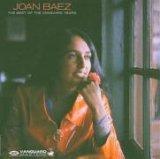Joan Biased
 In the wake of the Dylan docus, Simon and I both wanted to run out and buy some... Joan Baez (now that's clever marketing). So Simon bought Diamonds and Rust and I bought The Best of the Vanguard Years, because I wanted in particular to get "Love Is Just A Four Letter Word."
In the wake of the Dylan docus, Simon and I both wanted to run out and buy some... Joan Baez (now that's clever marketing). So Simon bought Diamonds and Rust and I bought The Best of the Vanguard Years, because I wanted in particular to get "Love Is Just A Four Letter Word."You have to understand that my only exposure to Joan Baez until now was when I saw her in the much earlier Dylan docu Don't Look Back. I was aware that she had an extraordinarily powerful voice based on her appearance in that film, but nothing I'd read about her ever made me want to hear her stuff.
I've read criticism of her before, along the lines of her destroying source material (maybe not that extreme), or not "getting" the sarcasm in a Dylan song, for example. I can see why people might say that kind of thing, and I'll talk more about that in a moment. But first, that voice.
No doubting its power; you might say, compared to Dylan - her contemporary and close peer at times - she's the sweet to his sour, the yin to his yang, the citron to his zest. But while her voice is sweet and powerful, it's also not always note perfect, and it is often too shrill for these ears to really warm to it. At times it struck me a little bit like when opera singers attempt to sing pop - not quite right, in other words. Still, those moments pass.
That said, she has a way with a song, a sense of phrasing and timing that is unique, and I think she is a great interpreter of other people's materials. Which brings us back to whether she "gets" the material or not.
First track on the album is "It's All Over Now, Baby Blue," which she sings with her characteristic sweet lilt. You might argue that she misses the anger, the sarcasm, in the song, but you would be wrong. What she's doing is turning the song around, reflecting back the anger to whence it came, and using the classic folk technique of disguising even the most horrific subject matter with a sweet-sung melody.
Think for example of that "Ballad of the Gliding Swan" that Dylan performed in the long-lost Mad House on Castle Street BBC play.
Tenderly William kissed his wife.
Then he opened her head with a butcher's knife.
And the swan on the river went gliding by.
Another Dylan number with a beautiful melody and horrifying content is "The Lonesome Death of Hattie Carrol." The fact that Dylan's vocal technique was slightly different doesn't take away the beautiful melody, which another singer, like Baez, might emphasise more.
Does she "get" it? Of course she does. Does she know that the narrator of "The Night They Drove Old Dixie Down," Virgil Cain, is a man? Of course she does. But whereas Lulu might change the lyrics so she's singing about a man, Baez is always true to the spirit of the song, so she stays in the first person, and she performs the song - a jaunty, country version of the song, true, but the sugar coating on the bitter pill is a long and respectable tradition in folk music.
So let's have no more of Baez "missing the point" - that kind of criticism only reveals the ignorance of the critic.
The great thing about Baez's treatment of a song is that she often divorces it from the version you might know and love, and yet she manages to stay true to the material. If anything, you're left with a greater affection for it. Her version of "Farewell, Angelina" is beautiful; and she makes me want to have a go at Willie Nelson's "Help Me Make it Through the Night" (and I hate Nelson's own version). Probably my favourite track here is "Let It Be," which is so strong - and deliberately different from the piano-driven original. Again, it reminds you that the song itself is sheer class. Baez's version brought tears to my eyes.
All this and "Love Is Just a Four Letter Word," which has to be one of Dylan's best (unrecorded!) songs, makes The Vanguard Years an enjoyable collection, certainly worth a go.

1 Comments:
Audio clip:
http://preview.tinyurl.com/2m9tc7
By Anonymous, at 2:29 am
Anonymous, at 2:29 am
Post a Comment
<< Home